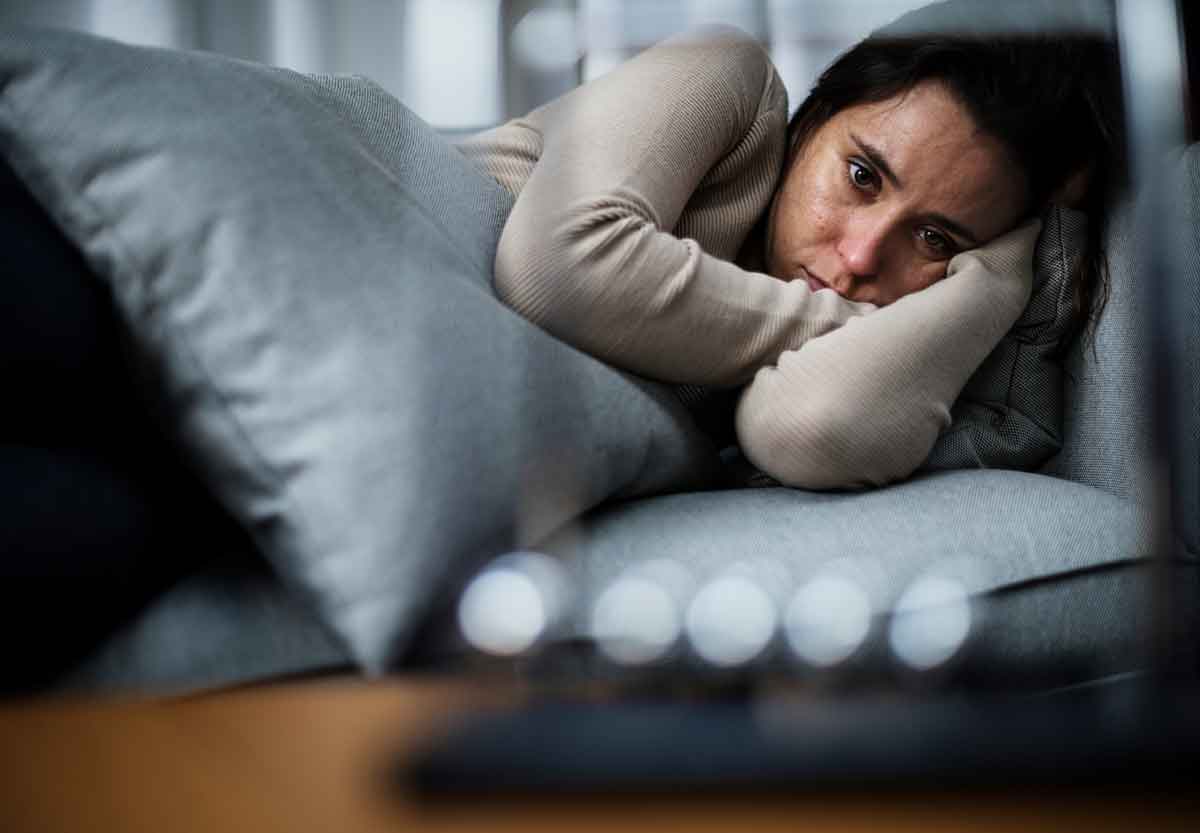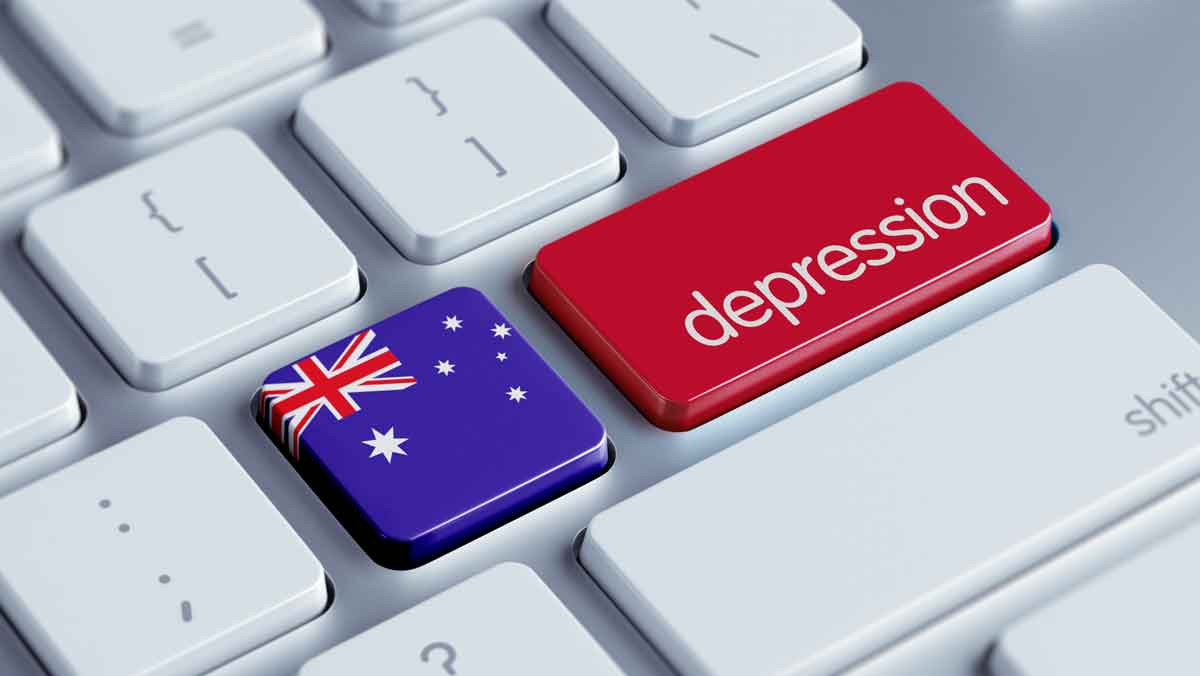It wasn’t that long ago that “depression” was the proverbial elephant in the room – a term that, when uttered, would evoke raised eyebrows or plunge the room into an awkward silence, revealing a society that either dismissed its gravity or conveniently swept it under the rug.
This mental health condition that once was severely misunderstood and underestimated is now taking centre stage as an invisible menace taking a heavy toll on populations worldwide.
And Australia, the sun-kissed land of iconic landscapes, laid-back lifestyle, and booming urban centres, is far from exempt from this issue. In this comprehensive guide to depression down under, we’ll explore the concerning facts, statistics, and available treatments.
Overview of Depression in Australia
Depression is an uphill battle that millions worldwide struggle with, and Australia is certainly no stranger to its effects. It is alarming that the World Health Organization has projected that by 2030, depression will represent the biggest level of disability associated with any physical or mental disorder globally, highlighting a need for immediate action.
From the hustling urban hubs of Sydney and Melbourne to the isolated rural communities of the Outback, depression strikes Aussies from all walks of life and age groups. It does not play favourites, affecting people of all backgrounds, socio-economic groups, and indigenous and non-indigenous communities alike.
How Common Is Depression in Australia
There’s no sugarcoating it; the rate of depression in Australia is concerning. According to a recent report published by the Australian Bureau of Statistics, the figures are stark.
It revealed that more than two in five Australians aged 16-85 years (43.7% or 8.6 million people) had experienced a mental disorder at some point in their life. This figure includes a range of conditions, with mood disorders like depression and anxiety being the most widespread.
What’s even worse is that most don’t seek treatment for it either; The Australian Bureau of Statistics revealed that 54% of people with mental illness don’t access any treatment, a worrying statistic that could be attributed to fear or stigma around talking about their feelings.
Suicide And Depression In Australia
Depression can be a silent killer, often leading to the heartbreaking tragedy of suicide. It’s estimated that almost 80% of suicides are preceded by a mood disorder such as depression.
This statistic reflects Australia’s worrying suicide rate, inspiring numerous prevention and intervention initiatives such as awareness campaigns, mental health education programs, and crisis services.
But even with these measures in place, Australia is still currently the second-highest prescriber of antidepressant medicines among the 33 OECD countries, with eighty-nine in every 1,000 Australians currently prescribed some kind of daily antidepressant.
And while medication has its place when managing depression – there needs to be more done if we’re going to make a real difference here. A holistic approach is required to make meaningful progress against this insidious illness and ensure everyone gets access to appropriate care when they need it most.
What Is Depression?
Depression is a complex mental health condition that goes beyond occasional sadness. It’s a persistent state of low mood, often accompanied by physical symptoms, that can significantly impact daily life. Unlike temporary feelings of sadness, depression is consistent, intense, and often without a clear cause.
And it’s not a sign of weakness or something that you just shake off or ignore. It’s a real, serious condition.
Feeling sad is part of what it is to be human, but if you’re feeling low for an extended period, that’s another story. You should reach out to your GP or, at the very least, confide with a friend or family member about how you are feeling. We can assure you that it’s treatable, and we’ve seen many people with depression make a full recovery.
Types of Depression
Depression isn’t a singular, monolithic disorder but rather a spectrum of related conditions that manifest in different ways.
Major Depressive Disorder (MDD)
Major Depressive Disorder is not just feeling sad or down for a few days; it’s a persistent state of low mood and lack of interest that lasts for at least two weeks and often much longer.
One of the ways MDD can manifest is through what’s known as anxious distress. This is when symptoms of anxiety are present alongside depression. Individuals with anxious distress may feel tense and restless and have trouble concentrating because they worry so much. They may fear that something awful might happen, or they may feel that they might lose control of themselves.
Another common experience is melancholic depression, characterised by a lack of pleasure in all or most activities and a lack of reactivity to usually pleasurable stimuli. This isn’t just a case of “not enjoying things as much as you used to.” It’s more like a profound sense of joylessness that permeates all aspects of life. People with melancholic depression may also experience significant weight loss or gain, excessive or inappropriate guilt, and worsening of symptoms in the morning.
Persistent Depressive Disorder (PDD)
PDD, previously known as dysthymia, persistent low-grade depression. It differs from Major Depressive Disorder in that it is a long-term, chronic form of depression lasting at least two years, persistently casting a shadow over everyday life.
PDD is often less severe than Major Depressive Disorder, but its chronic nature can make it equally, if not more, debilitating. Imagine feeling low, losing interest in daily activities, struggling with low self-esteem, and finding it hard to concentrate or make decisions, and this going on day after day, month after month – incredibly draining.
Despite its chronic nature, PDD can sometimes fly under the radar. Because the symptoms are less severe, people with PDD might still be able to go about their daily routines. They might be holding down a job, maintaining relationships, and fulfilling other responsibilities. But underneath, they’re fighting a constant battle against persistent low mood. This can make PDD a bit of a silent struggle for some people.
Bipolar Disorder
Bipolar disorder, formerly known as ‘manic depression’, is a tumultuous experience in which individuals battle with extreme highs and lows of emotion. These wild mood swings can cause them to feel euphoric one moment and plunged into deep despair the next – lasting for days or weeks at a time.
When manic, those who have bipolar disorder may have unusually high energy levels along with grand ideas that they act upon impulsively without considering the consequences. In stark contrast to the frenetic energy of the manic phase, during depressive episodes, those with bipolar tend to feel persistently sad and lose interest in activities they used to enjoy.
While bipolar disorder is a lifelong condition with no cure yet available, it can still be effectively managed through appropriate treatment so those affected can live healthy lives despite their diagnosis.
Psychotic Depression
Psychotic Depression occurs when some form of psychosis accompanies a severe depressive illness. The psychosis could be hallucinations (seeing or hearing things that aren’t there), delusions (false beliefs), or some other break with reality.
This combination of symptoms can make psychotic depression particularly challenging. Not only are individuals dealing with the weight of depression, but they’re also trying to navigate a world that may seem distorted or threatening.
Postpartum Depression
Postpartum depression can manifest in women after childbirth. It’s more than the fleeting “baby blues” – which can include temporary mood swings, teariness and anxiety – but rather a prolonged period of deep sadness, fatigue and fear that makes it difficult for new mothers to care for themselves or their newborns.
Situational Depression
Situational depression, also known as adjustment disorder with depressed mood, is a type of depression that’s directly related to specific events or situations. Usually, you can pinpoint the trigger that led to it – the death of a loved one, job loss or any other stressful major life change. It’s a natural and understandable response to hardship or trauma.
Situational depression is usually temporary, subsiding once the individual has had time to adjust to the situation or the situation itself has been resolved. Still, it doesn’t make it any less challenging for those going through it. The feelings of sadness and hopelessness can be just as intense as in other forms of depression.
Situational depression is a normal response to these major life stressors, but if you’re struggling, therapy can provide valuable tools for coping and help you navigate your way through the situation.
Seasonal Affective Disorder (SAD)
We won’t really dwell too long on SAD as it rarely has many effects on Australians, as Oz tends to have a fairly even climate year-round. But still, it can’t be entirely ruled out, with some Australians experiencing bouts of SAD as the seasons change. Fortunately, if the symptoms are experienced, they usually end up being mild and don’t last very long.
What Are the Symptoms of Depression?

Those suffering from depression experience physical and emotional symptoms. These are some common symptoms.
- Feeling sad, down, or hopeless for most of the day
- Losing interest in activities you used to enjoy
- Changes in appetite or weight
- Trouble sleeping or sleeping too much
- Feeling tired or lacking energy
- Difficulty making decisions or concentrating
- Feeling guilty, worthless, or helpless
- Physical symptoms such as headaches or stomach problems
- Thoughts of death or suicide
What Are the Causes of Depression?
Depression can be caused by a combination of underlying factors that include:
- Genetics and family history of depression
- Imbalances in brain chemicals
- Changes or disruptions in hormonal levels
- Chronic stress, such as work-related stress or financial stress
- Trauma and abuse
- Chronic illness or chronic pain
- Relationship difficulties or social isolation
- Substance abuse or addiction
- Major life changes, such as the loss of a loved one or job loss
Of course, these factors do not always lead to depression, and not everyone who experiences them will necessarily develop depression.
It should also be recognised that there’s no single factor that causes depression, and it can be a combination of these different elements we’ve outlined. It can often be a Catch-22 situation, where one factor can lead to depression, and then the depression itself leads to other problems or vice versa.
It might be that someone with a substance abuse disorder, such as alcoholism, is already experiencing depression. The person may be looking for solace in alcohol, which can then lead to more severe depression and even suicidal thoughts.
When to Seek Treatment
Recognising depression in yourself or a loved one isn’t always a straightforward task. It’s very easy to brush off feelings of sadness and exhaustion as just normal responses to stress, missing the red flags that they may be symptomatic of a deeper problem.
Here’s when you should seek help:
- If you’re feeling persistently sad, down or empty for more than two weeks, especially if these feelings don’t lift or improve with positive events or experiences.
- If these feelings interfere with your daily activities – such as work, school or relationships.
- If you’ve lost interest in activities you once enjoyed, or if you’re avoiding social activities.
- If you’re experiencing physical symptoms such as significant changes in weight or appetite, sleeping issues, constant fatigue or unexplained aches and pains.
- If you’re feeling hopeless or helpless or have recurring thoughts of death or suicide.
Where to Seek Treatment

In Australia, you have several options for seeking treatment. Your first point of contact should typically be your General Practitioner (GP), who can diagnose depression and provide initial treatment and referral to mental health specialists if necessary.
Psychiatrists – These are medical doctors specialising in mental health, including depression. They can provide comprehensive treatment, including medications.
Psychologists – They offer psychotherapy (talk therapy) and cognitive-behavioural therapies, crucial components in treating depression.
Mental Health Clinics – Australia has various clinics providing a range of treatments, often hosting a team of mental health professionals.
Online and Telehealth Services – With digital healthcare becoming increasingly prominent, many Australians prefer access to therapy and counselling remotely.
Support Groups – These can offer a sense of community, shared understanding, and strategies for managing depression.
Despite these local options, some Australians still look abroad for depression treatment. One notable place they consider is The Dawn, a mental health retreat located in the serene settings of Thailand, offering a unique blend of Eastern and Western therapy techniques.
Healing Abroad: The Dawn Rehab Thailand

When considering depression treatment, one might not immediately think of leaving their home country. Yet, often, a refreshing change of environment can provide a unique perspective on recovery. That’s exactly what we at The Dawn Wellness Centre and Rehab in Thailand offer.
Interestingly, The Dawn has become a popular choice for Australians seeking drug and alcohol rehab outside Australia.
Nestled in the suburb of Chiang Mai amidst tranquil riverside surroundings, The Dawn provides a haven of healing and recovery, far removed from the daily triggers and stressors. Our centre is internationally accredited, offering separate programmes for mental health and addiction rehab, making us a trusted name in the field of mental health care.
We have developed a unique mental health programme distinct from our addiction treatment programme. This means that while we cater to those struggling with mental health issues not related to addiction, we can also seamlessly transition between the two programmes for individuals who have also turned to substances to cope with depression.
What sets us apart at The Dawn is our holistic approach to treatment. We understand that healing requires a comprehensive perspective, one that considers the whole picture – the presenting issue, underlying issues, past experiences, relationships, environment, and family dynamics. We have woven this understanding into our treatment plans, combining ground-breaking Western therapeutic techniques and traditional Asian wellness practices to address problems at their source.
Our therapies aren’t limited to conventional practices. At The Dawn, we believe in broadening the therapeutic horizon. For our clients who have resistance to antidepressant medication, we introduce TMS (Transcranial Magnetic Stimulation) therapy. This non-invasive procedure utilises magnetic fields to stimulate nerve cells in the brain, providing an alternative medication-free path towards recovery.
Our commitment extends to providing personalised care for every client, and during your stay with us, you’ll enjoy private accommodation in our beautiful riverside facility equipped with full-service amenities.
We understand the financial concerns that may accompany the decision to seek treatment. Thus, despite our world-class facilities and the high standard of care we provide, our treatment programs come at only 2/3rd of the price of top-quality centres in the West. This is possible due to Southeast Asia’s lower cost of operations, allowing us to hire top-calibre clinicians by Western standards to ensure you receive the best care.
Thailand’s proximity to Australia is another benefit. The relatively short and direct flights make it a more convenient choice for Australians seeking treatment abroad, reducing the strain of travel.
Even when you return home to Australia, our care continues. We offer online group counselling sessions, providing continued support as you transition back to everyday life.
Key Takeaways
The black dog of depression is an all-too-familiar issue for many Australians, with almost two in five experiencing it at some stage. Statistics show a staggering 43.7% of Australians aged between 16-85 years old living with some form of mental disorder, with depression being the most common among mood disorders.
What’s more concerning is that over half of these individuals never seek help to grapple with their inner demons- likely due to fear and stigma from society, which stops them from opening up about what they are going through inside. Without proper care and attention, depression can lead to severe repercussions on physical and personal life.
This underlines the vital importance of seeking professional assistance for depression. One effective solution is The Dawn’s Depression Retreat in Thailand. Our exceptional wellness program offers a customised approach to treating depression, providing a compassionate, understanding environment to delve into the root causes of your depression and learn practical coping strategies.
Our clinical team at The Dawn works tirelessly to equip you with the tools you need to combat depression, all while you rejuvenate in our serene wellness centre amidst the captivating beauty of Northern Thailand. Treatment at The Dawn Depression Retreat isn’t merely about managing symptoms; it’s about understanding yourself better, rebuilding your life, and learning to thrive despite your struggles.
FAQs
Q: Is depression a lifelong condition, or can it be cured?
A:Yes, in many cases, depression can be effectively treated and cured. However, it can also be a recurring or lifelong condition for some, requiring ongoing management and treatment. The nature of depression varies widely among individuals, with some experiencing single episodes and others having recurrent bouts.
Regardless, with appropriate treatment strategies, and lifestyle changes, individuals can lead fulfilling lives while managing their symptoms.
Q: Can I recover from depression without treatment?
A: It’s possible for some people to recover from mild forms of depression without formal treatment, using self-care strategies and social support. However, moderate to severe depression requires professional treatment to manage symptoms and prevent recurrence effectively. Even if symptoms seem mild, seeking help is still important, as untreated depression can worsen over time.
Q: Why might some Australians choose to seek treatment for depression abroad?
A: Australians might choose to seek treatment for depression abroad to access alternative or holistic treatments not widely recognised in Australia. They may be attracted to a perceived higher level of personal attention or quality of care available overseas. Also, despite Australia’s healthcare system, out-of-pocket costs can be substantial for some treatments, driving individuals to seek more cost-effective solutions abroad.
Resources
Beyond Blue
Offers immediate support, advice, and action on a wide range of mental health issues
Website: https://www.beyondblue.org.au/
Helpline: 1300 22 4636
Lifeline Australia
24-hour crisis support and suicide prevention services
Website: https://www.lifeline.org.au/
Helpline: 13 11 14
Headspace
Early intervention mental health services to 12-25-year-olds
Website: https://headspace.org.au/
SANE Australia
Support, training, and education, enabling those with mental illness to lead a better life
Website: https://www.sane.org/
Helpline: 1800 18 7263
Black Dog Institute
Resources and research to improve the lives of people affected by mood disorders
Website: https://www.blackdoginstitute.org.au/
Mind Australia
Mental health services for people dealing with the day-to-day impacts of mental illness
Website: https://www.mindaustralia.org.au/
Related Posts
 Anxiety in Australia: Facts, Statistics & Treatment
We all feel anxious from time to time. For many, it’s a natural reaction when facing a stressful situation. Once that under-pressure moment is over, everything goes back to normal....
Anxiety in Australia: Facts, Statistics & Treatment
We all feel anxious from time to time. For many, it’s a natural reaction when facing a stressful situation. Once that under-pressure moment is over, everything goes back to normal....
 Drug Addiction Problems in Australia
Substance addiction and abuse might be global problems, but few developed countries have struggled with them as much as Australia. According to recent reports, around 1 in 20 Australians struggle...
Drug Addiction Problems in Australia
Substance addiction and abuse might be global problems, but few developed countries have struggled with them as much as Australia. According to recent reports, around 1 in 20 Australians struggle...
 Alcohol Addiction Problems in Australia
Excessive alcohol consumption remains a major concern in Australia. According to the official National Health Survey for 2020-21, one in four Australians aged 18 and over exceeded the national alcohol...
Alcohol Addiction Problems in Australia
Excessive alcohol consumption remains a major concern in Australia. According to the official National Health Survey for 2020-21, one in four Australians aged 18 and over exceeded the national alcohol...
 Guide to Addiction Treatment Abroad for Australians
Although addiction remains a major concern in Australia, more Australians have begun to seek professional help battling their problem. And what might be surprising is that most of these treatment-seeking...
Guide to Addiction Treatment Abroad for Australians
Although addiction remains a major concern in Australia, more Australians have begun to seek professional help battling their problem. And what might be surprising is that most of these treatment-seeking...





